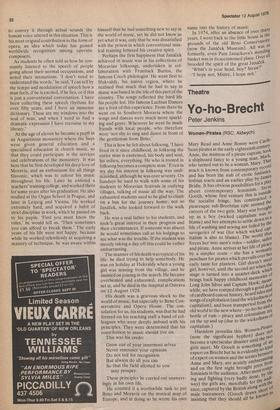to convey it through actual sounds the human voice uttered
in this situation. This is his most original contribution to the form of opera, an idea which today has gained worldwide recognition among operatic composers.
As students he often told us how he constantly listened to the speech of people going about their normal occupations, and noted their intonations. 'I don't need to understand the words,' he said, 'I can tell by the tempo and modulation of speech how a man feels, if he is excited, if he lies, or if this is just a conventional conversation. I have been collecting these speech rhythms for over fifty years, and I have an immense dictionary. These are my windows into the soul of man, and when I need to find a dramatic expression I have recourse to my library.'
At the age of eleven he became a pupil in an Augustinian monastery where the boys were given general education and a specialised education in church music, so that they could participate in the services and celebrations of the monastery. It was here that he first developed his deep love of Moravia, and an enthusiasm for all things Slavonic, which was to colour his music throughout his life. Later he entered a teachers' training college, and worked there for some years after his graduation. He also studied at the Organ School in Prague, and later in Leipzig and Vienna. He worked extremely hard, and acquired a habit of strict discipline in work, which he passed on to his pupils. 'First you must know the rules,' he would tell us. 'Then sometimes you can afford to break them.' The early years of his life were not happy, because while he worked relentlessly at acquiring a mastery of technique, he was aware within himself that he had something new to say in the world of music, yet he did not know as yet what it was, only that he was dissatisfied with the prison in which conventional musical training fettered his creative spirit. Perhaps the first happiness that Jangek achieved in music was in his collections of Moravian folksongs, undertaken in col laboration with Frantisek Bartos, the famous Czech philologist. He went first to Hukvaldy, his native region, where he realised that much that he had to say in music was based in the life of this part of the country. The songs reflected the hard life his people led. His famous Lachian Dances are a fruit of this experience. From there he went on to Southern Moravia where the songs and dances were much more sparkling and gayer. Wherever he went he made friends with local people, who therefore were 'not shy to sing and dance in front of the gentleman from Brno.'
This is how he felt about folksong, 'I have lived in it since childhood, in folksong the entire man is enshrined, his body and soul, his milieu, everything. He who is rooted in folksong becomes a complete man.' Even in ' my day his interest in folksong was undiminished, although he was over seventy. On Sundays he used to walk with some of his students to Moravian festivals in outlying villages, talking of music all the way. The exhausted students used to be glad to climb on a bus for the journey home; not so Jankek, who looked forward to the walk back.
He was a real father to his students, and toolea great interest in their progress and their circumstances. If someone was absent he would sometimes call at his lodgings to see what was the trouble. If the student was merely taking a day off this could be rather embarrassing.
The manner of his death was typical of his life: he died trying to help somebody. He was on holiday at Hukvaldy when a young girl was missing from the village, and he insisted on joining in the search. He became overheated and exhausted, complications set in, and he died in the hospital at Ostrava on 12 August 1928.
His death was a grievous shock to the world of music, but especially to Brno Con servatoire and Opera House. The con solation for us, his students, was that he had formed on his teaching staff a band of col leagues who were deeply imbued with his principles. They were determined that his contribution to music should live on. This was his credo: Grow out of your innermost selves Never renounce your opinions Do not toil for recognition But always do all you can So that the field allotted to you may prosper.
These principles he carried out unswervingly in his own life.
He counted it a worthwhile task to put Brno and Moravia on the musical map of Europe, and in doing so he wrote his own name into the history of music.
In 1974, after an absence of over thirtY years, I went back to the little house in the grounds of the old Brno Conservatoire (now the Jangek Museum)All was as formerly, even Pam Janackova's mending basket was in its accustomed place. Over all brooded the spirit of the great Janki6ek.
.
'What's in your head, boy? Straw?'
'I hope not, Mistre, I hope not.'






























 Previous page
Previous page